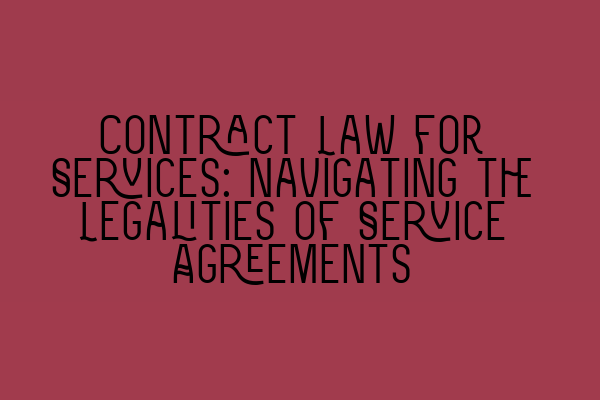Contract Law for Services: Navigating the Legalities of Service Agreements
Welcome to our comprehensive guide on contract law for services. Whether you’re a business owner offering services or an individual seeking service providers, understanding the legalities behind service agreements is crucial. In this blog post, we will break down the key aspects of contract law that you need to know to ensure a smooth and legally sound service agreement.
What is a Service Agreement?
A service agreement is a legally binding contract between a service provider and a client. It outlines the terms and conditions under which services will be provided, including the scope of work, payment terms, and any additional obligations. The service agreement serves as a roadmap for both parties, ensuring that each party understands their rights and obligations throughout the duration of the service.
Key Elements of a Service Agreement
1. Service Description: Clearly define the services to be provided. This helps avoid any ambiguity and ensures that both parties are on the same page. Include details such as the nature of the services, timelines, and any specific deliverables.
2. Payment Terms: Outline the payment structure, including the service fees, method of payment, and any additional costs that the client may be responsible for. Ensure that the payment terms are fair and reasonable for both parties.
3. Term and Termination: Specify the duration of the service agreement and the conditions under which either party can terminate the agreement. Include details on how termination notice should be given and any consequences for early termination.
4. Intellectual Property Rights: Address ownership and usage rights of any intellectual property created or used during the provision of the services. This includes copyrighted materials, trademarks, and any proprietary information.
5. Confidentiality: Include provisions to protect confidential information exchanged between the parties during the course of the agreement. Clearly outline the obligations of both the service provider and the client to maintain confidentiality.
6. Limitation of Liability: Define the extent of liability for both parties in case of any damages or losses that may occur during the provision of services. This helps minimize risk for both parties and avoids any potential disputes.
Enforceability of Service Agreements
To ensure the enforceability of your service agreement, there are several factors to consider:
1. Offer and Acceptance: A valid service agreement requires a clear offer from one party and an unequivocal acceptance by the other. Ensure that the agreement clearly reflects the intention of both parties to be bound by its terms.
2. Consistency and Clarity: The terms of the agreement should be clear, unambiguous, and free from any inconsistencies. Vague or contradictory clauses can lead to disputes and legal complications.
3. Consideration: A service agreement must involve some form of consideration, which is usually the payment for services. Ensure that the consideration is clearly stated and has a legal value.
4. Capacity: All parties involved in the service agreement must have the legal capacity to enter into a contract. This means they must be of legal age and mentally competent to understand and fulfill their obligations.
5. Compliance with Applicable Laws: Ensure that your service agreement complies with all relevant laws and regulations. Consider seeking legal advice to ensure compliance, particularly if you operate in a highly regulated industry.
Conclusion
Navigating the legalities of service agreements is essential for both service providers and clients. By understanding the key elements of a service agreement and ensuring enforceability, you can safeguard your rights and interests.
Remember, it’s always advisable to seek legal assistance when drafting or reviewing service agreements to ensure that they are tailored to your specific needs and comply with the relevant laws. A solicitor specializing in contract law can provide invaluable guidance and help protect your business interests.
At SQE Contract Law, we specialize in contract law for services and can provide professional advice and assistance. Contact us today to learn more about how we can help you navigate the legal complexities of service agreements.
